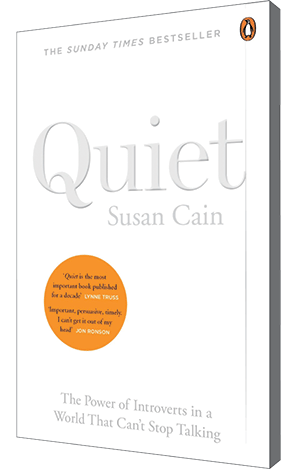Quiet — The Power Of Introverts in a world that can’t stop talking by Dr. Susan Cain penguin books; Price: Rs.309: Pages: 333
 One way of categorising people according to personality types is to gauge where they fall on the introversion-extroversion spectrum. Introverts are more often drawn to the inner world of thought and sentiment, while extroverts are attracted to the external life of people and activities. Introverts prefer being with themselves. Extroverts love to socialise.
One way of categorising people according to personality types is to gauge where they fall on the introversion-extroversion spectrum. Introverts are more often drawn to the inner world of thought and sentiment, while extroverts are attracted to the external life of people and activities. Introverts prefer being with themselves. Extroverts love to socialise.
One’s position on the introvert-extrovert spectrum determines the choice of friends and spouses, hobbies, jobs and the types of books people read, about how they manage the thousand unnatural shocks the flesh is heir to, and so on.
Functional societies need people representing a wide range of personality types, from the gregarious and assertive to the quiet and contemplative. Yet, as Dr. Susan Cain, a Princeton University and Harvard Law School alumna and Wall Street lawyer-turned-writer asserts in this incisive and well-researched book, societies usually accept a remarkably narrow range of personality styles. We are told that to be great is to be assertive and ‘outgoing’, to be happy is to be sociable — or, in other words, being extroverted is an ideal, to which everybody should aspire.
On the other hand, introverts are projected as maladjusted, deviant or even pathological. Constantly communicating with people (in the ‘real’ and ‘virtual’ worlds), and incessantly consuming noise (emitted by ourselves, other people and a burgeoning variety of talking contraptions) is projected as being ‘modern’ and ‘living life to the hilt’. Enjoying silence and solitude is widely interpreted as a marker of depression, or worse.
A self-admitted introvert, the author laments the glorification of the extrovert, and coterminously the denigration of introverts in contemporary American culture, business, academia and even in powerful American religious organisations.
It wasn’t always like this in America (and, therefore, elsewhere in the world), she contends. Extroversion emerged as an American cultural ideal as a result of the shift from a “culture of character” to a “culture of personality”, as the US transitioned from a rural to a highly urbanised economy. In pre-industrial America, manifestations of a “culture of personality” were duty, work, honour, morals, integrity, manners, and good deeds.
The ideal personality was serious, disciplined, and honourable. What counted then was not the impression one made in public, but how one behaved in private. All that changed with the rise of the culture of personality, which came to define the landscape of 20th century America.
Consumed with their own material advancement, personality projection became more important for Americans than character development. “They became captivated by people who were bold and entertaining,” writes Cain.
While traditional cultures still value people who are meditative, contemplative, ethical and religiously observant — often people with introverted mindsets — the new American “culture of personality” is shaped by wealth, aggression and rugged individualism. Glib talk and smart social skills are seen as exceptional qualities and projected as the epitome of success.
The cult of the extrovert where the purpose of life is defined in starkly materialistic terms — of acquiring as much power, ‘glamour’ and money as quickly as possible — has horrific consequences for introverted children, writes Cain. Thoughtful, reflective and intelligent children are often chided by parents and constantly needled to “come out of their shells”, “go make friends”, and “stop being shy”. Such parents, school mates and teachers who routinely dismiss introverts as stupid, slow and anti-social, feed their worst fears. Taciturn herself by nature, Cain can sensitively empathise with people in her situation, in a dominant culture which glorifies extroverts.
The common belief that introverted children suffer from inferiority complexes and need to mend themselves or they will become “failures”, often becomes a self-fulfilling prophecy with tragic consequences. Cain urges parents to nurture such children with special care and understanding.
Although spiritual people are mentioned only in passing in this book, it’s worthy of note that some of the world’s great religious leaders and thinkers were quiet, unassuming individuals inclined towards introspection, contemplation, reflection and prayer. The world is indebted to strong, silent individuals to a greater extent than is admitted.
Roshan Shah
Intellectual tour de force
No Country by Kalyan Ray bloomsbury; Price: Rs.599; Pages: 550
‘And I quit as I would an inn, not a home, for nature has given us lodging for a sojourn, not a permanent residence’. (Cicero)
If one word captures the spirit of Kalyan Ray’s No Country, it’s ‘sojourn’ from the words of Cicero above. It has been described as a family drama in some reviews, and a love story in others. But essentially, this is a narrative about sojourns, ships setting sail for distant shores with characters who seek asylum, set up house in far-off lands and yet long for homes, real or imagined.
150 odd years, ten narrative voices, and dizzying trajectories of characters in search of home, No Country is written with a lot of passion. The heft of the book (550 pages), the lavishly mounted scope of its landscapes, from County Sligo in 1843 to India, Canada, Italy and America, and the passions and disappointments of its protagonists, all are testament that the book is an intellectual tour de force, not for those in search of a ‘quick read’. It’s a book where a maze of dots needs to be connected, for the big picture to emerge.
The narrative opens with a double murder of an Indian couple in upstate New York in 1989, and the quest for motive takes the reader back in time to 1843 in County Sligo, Ireland. Rapacious landlords, helpless tenants, terrible consequences for inability to pay rents, and hunger as a constant presence: this is the backdrop of deprivation against which two young boys — Padriag Aherne and Brendan McCarthaigth — learn their early lessons of love and suffering.
Padriag escapes from the consequences of murder by finding work on a ship that will take him to India. Little does he know of the birth of his illegitimate daughter, Maeve, who will accompany his loyal friend Brenden to North America to escape certain death by starvation brought on by the Irish potato famine.
Padriag strikes roots in India, starting a family and building a life, his progeny leading the second class citizen’s life of the Anglo-Indian. Meanwhile, his daughter Maeve is being brought up across the oceans by ‘Papa Brenden’, who lives in the ardent hope his friend Padriag will find him one day. Maeve’s children in turn will grow up in America to encounter the joys and hazards of life and work in that promiseland. The story of the novel traces the journeys of Padraig’s two separate families which will eventually cross paths in New York, after the slow crawl of 150 years, five generations, and tectonic shifts in history and politics.
Along with hope and despair, death stalks the lives of the characters, taking away mothers, daughters, husbands and children. The vortices of history Ray sets his tale against are those of suffering and loss: the Irish Famine; subsequent journeys out of Ireland in benighted ships; the Jallianwala Bagh massacre; the Triangle Shirtwaist Factory fire in New York; the partition of India and Pakistan.
Again, the element of grimness in the tale cannot be wished away. History is woven into the narrative sometimes delicately, and at times in a somewhat forced manner, so that certain parts of the storytelling lose their fluidity. This is especially true in the latter part of the novel where characters swell in bewildering profusion and sometimes seem to be planted in the very path of the juggernaut of a cataclysmic moment in history. Lives and loves are made and unmade by the ebb and swell of history, politics and natural disasters.
The profusion of narrative voices could have been controlled. Characters give somewhat forced introductions of their lineage, motives, and sometimes poetic descriptions of their dying moments. The effect can be jarring at times, especially towards the latter bit of the narrative, where engaging with minor voices can prove to be taxing for the reader. It detracts from the pleasure of reading Ray’s otherwise lush prose, which makes up for the somewhat inept use of the frame narrative.
Florid in parts, flaccid in some, and riveting in yet others, No Country is still a brave work, grand in conception, and tropical in imagination. Read it for some memorable characters and episodes, for its sensitive handling of how identities are forged in a globalising world, where ‘home’ is a complex construct. Read it also for its affirming message about the triumph of the human spirit despite the fragility of our hopes.
No Country is a metaphor in itself which throws light on how deceptive the lines on maps are, and how compelling the pulls of blood and friendship.
Priyanka Bhattacharya























